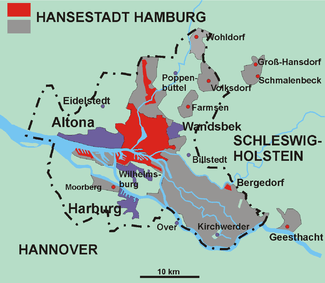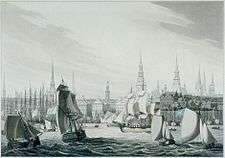Greater Hamburg Act

Urban and suburban territories of the Free and Hanseatic City of Hamburg prior to 1937
Urban territories of the towns of Altona, Harburg and Wandsbek prior to 1937
The Greater Hamburg Act (German: Groß-Hamburg-Gesetz), in full the Law Regarding Greater Hamburg and Other Territorial Readjustments (German: Gesetz über Groß-Hamburg und andere Gebietsbereinigungen), was passed by the government of Nazi Germany on 26 January 1937, and mandated the exchange of territories between Hamburg and the Free State of Prussia. It became effective on 1 April 1937.[1]
Larger Hamburg
Hamburg lost most of its exclaves, including Geesthacht and Cuxhaven. In return, Hamburg was enlarged by including formerly Prussian towns like Altona, Wandsbek, and Harburg-Wilhelmsburg as well as a number of villages. This represented the formal merger of what had previously been referred to as the "Four-City Region".
A symbolic but important change was the "renaming" of Hamburg. It had to be referred to as "Hansestadt Hamburg" ("Hanseatic City of Hamburg") instead of "Freie und Hansestadt Hamburg" ("Free and Hanseatic City of Hamburg"). The reference to freedom in the older name dates back to the Holy Roman Empire, which included a number of more-or-less sovereign Imperial free cities, including Hamburg.
Prussia
Besides the regulations for Hamburg, the law merged the Free City of Lübeck with Prussia. Some smaller villages were included in the State of Mecklenburg. Lübeck had been an independent member state of the federation that formed the Reich before the Gleichschaltung began to bring them into line in 1933–34. Adolf Hitler had a distaste for Lübeck ever since the city council forbade him to campaign there in 1932[2] although there was also a need to compensate Prussia for its losses to Hamburg. Besides Lübeck, which was incorporated into the Prussian Province of Schleswig-Holstein, Hamburg had to cede its possessions of Geesthacht, which went to Schleswig-Holstein as well, and Ritzebüttel (which included Cuxhaven), which went to the Prussian Province of Hanover. Out of the possessions Prussia ceded to Hamburg, the towns of Altona and Wandsbek had belonged to Schleswig-Holstein, while the town of Harburg-Wilhelmsburg had been a part of Hanover.
As all of Nazi Germany was divided into Gaue, the Gau leaders of the regions neighbouring Lübeck, Schleswig-Holstein and Mecklenburg, had been vying for control of the city from 1933. Its merging with Prussia represented the victory of the Schleswig-Holstein Gauleiter.
See also
Further reading
- Dr William Boehart: "Das Groß-Hamburg-Gesetz — Ein Rückblick 70 Jahre danach". In Lichtwark-Heft Nr. 71, November 2006. Verlag HB-Werbung, Bergedorf. ISSN 1862-3549.
Notes and references
- ↑ With the exception of paragraph 2 (unifying Hamburg to a single Gemeinde) which according to paragraph 15 had to be put into effect separately at a date determined by the minister of the interior no later than 1 April 1938, and with the exception of paragraph 10, which became effective immediately
- ↑ "Lübeck: The town that said no to Hitler". The Daily Telegraph. 2 June 2009. Retrieved 28 June 2010.
External links
| Wikimedia Commons has media related to Greater Hamburg Act. |
- Text of the law (in German)
